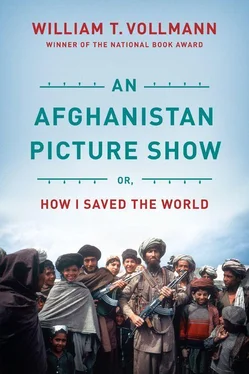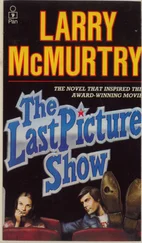f At that time I thought such distinctions very important, because if disease in the camps was no worse than it had been at home, then I could not blame the Soviet Union for it, so it did not matter. (If this book is only about the effects of the invasion of Afghanistan, then of course that is a fair way of looking at the matter. Fortunately for my soul, it isn’t.)
g “Abdul, four Fantas!”
h In 1982, the official rate of exchange was Rs. 11 to the dollar. The black-market rate was eight to ten rupees higher.
i Babrak Karmal was the Soviet puppet in Kabul, later replaced by Najibullah.
j The occupation forces found it convenient to conscript Afghans to fight the Mujahideen. The conscripts were put in the front lines; thus the Mujahideen could usually kill only other Afghans. Many boys were forcibly inducted at their high school graduation or earlier.
k Wittgenstein, Philosophical Investigations , I.393.
l However, some camp inmates did draw a distinction between Mujahideen (holy warriors in what was primarily seen as a religious war) and Mujahers (people who had become refugees as a result of anti-religious persecution). For the Afghans, the religious nature of events cannot be overemphasized. What they especially despised about the Soviet invaders was that they were atheistic. This helps to explain why they were so perplexed about public inaction toward their cause in the U.S.A. We Americans were also People of the Book, weren’t we? Then was it not our religious duty to help the Afghans? — The Afghans had many illusions still to lose about us.
6. THE LUCKY ONES: REFUGEES IN CALIFORNIA (1983–87)
One family including women and children found shelter in a cave, but Soviet soldiers killed them with grenades thrown into the entrance.
AFGHAN INFORMATION CENTRE, Monthly Bulletin No. 11 (March 1982)
Perhaps the most important and widespread issue concerning Afghans resettling in the U.S. is the psychological malaise or depression many experience … Though they are grateful for having been able to come to the U.S., Afghans still feel they are strangers in America.
ALLEN K. JONES, U.S. Committee for Refugees, Afghan Refugees: Five Years Later (January 1985)
The hairdresser
“So, we’re doing a perm and a cut?” said Anjilla, and Jenny nodded earnestly, her legs crossed; and while Anjilla got her client card Jenny sat looking into the mirror and playing with her hair. She had already put her smock on.
“It’s kind of long,” Jenny said. “If I cut it I’m going to get it permed anyway, so I might as well perm it.”
“It’s kind of dry,” said Anjilla. “So I’d like to use some lotion on it, if it’s okay with you.” She took Jenny back to wash her hair.
The hairdressing department was a bright place, bisected into a wide aisle and a series of semiprivate bays angled toward the window. Anjilla’s bay was halfway down the room. Her work space was impeccably clear, clean and ordered. Bottles and squeeze tubes stood at the base of the mirror. The cabinet top was white and spotless. The light shone upon it without glare.
Jenny came back wet and smiling, her hair pulled back from her forehead, while Anjilla stood behind her, a handsome brown woman in a blue silk blouse. She had thick black hair, thick black eyebrows and big black eyes. Jenny said she thought that she looked quite Persian. She worked the curlers into Jenny’s hair, talking happily about the vacation that she would take when her grandmother came from India next month. Jenny’s head was paved with curlers, like the plates of an armadillo. Anjilla tucked a strip of cotton around the circumference of Jenny’s head, added the perming solution, and slipped a plastic bag over the curlers.
“So, you like to work?” said Jenny, a little maliciously I thought. Anjilla’s family had once been well off.
Anjilla stiffened. “It’s fine,” she said.
Anjilla and Jenny both wanted to be doctors. They were both Asian immigrants. Jenny became a doctor. When she came to the United States, Anjilla lowered her expectations and hoped to be a nurse. But that didn’t work out, either. Her brother was going to be an engineer. He got a job as a mechanic. Her sister had been in dental school. She didn’t get a job. And Anjilla, here she was.
When the perm was done, she bent over Jenny. “Any trouble, let me know. Let me give you a dry towel.”
HOW TO BECOME A HAIRDRESSER IN ONE EASY STEP
Anjilla’s father had had three houses. They lived in Kabul. They had a gardener, and a servant who cleaned, and a servant who washed their clothes. Her uncle got shot in front of his house. After that they came here.
I remember crossing the mountains into Afghanistan when it was around ten in the morning and it was very hot and sunny as we went up among the rocks, and when at last we reached the summit of the ridge and looked down at the green meadow below us and the snow and ice along the shoulder of the next mountain, and mountains going on before us forever, we saw a group coming our way: a beautiful, proud-looking young woman and her family ascending the divide, leaving Afghanistan; and one of the men led a donkey that clopped along wearily with their possessions on its back. They came up to where we stood, passed us in silence, and went on down into Pakistan to be refugees.
They were going to have to descend the piles of chalk-colored boulders, and clamber down the cliff sides and go down into the trees and cross many streams until they came to Parachinar. Then they would sell their donkey and take a bus or a taxi through the desert to Peshawar, where they would be registered. Next they’d apply for visas and settle into an overcrowded hotel that cost twenty rupees a night (two dollars for me at the current exchange rate, which is to say two hundred dollars for them). Then they would wait. The average waiting time for visas to the United States was two years. Within a few weeks their money would run low. They could try to find work in Pakistan or India, or go to a camp, where it was so hot that their children would bleed from the nose and run high fevers. Because of the crowding in the camps and the dictates of Islamic modesty, that young woman I had seen — and her mother and grandmother — would have to wait until dark to go out and relieve herself. And the canal water that she washed pots in would be the same water that refugees drank from and used as a latrine. (“There is an Afghan proverb,” a man told me. “ ‘Water is clean if it turns over three times.’ ”) — She would become like the woman in brown and red who sat on the bank of sharp white stones looking at the river that was the color of her clothes, and her family’s clothes, the ones that she had just washed, lay wrung out beside her as she sat rocking herself and rubbing the back of her head; she would become like the man who posed for my Afghanistan Picture Show so patiently that he did not even brush a fly from his mouth; like the smiling boy with the growth below his eye; like the man who wore a heart locket around his neck. — Anjilla, however, was among the lucky ones. Her family flew West.
TWO MEMORIES
When Anjilla was little, she wanted to be one of the puji . *Her father used to let them come inside the house to drink during Ramazan. When she saw what happened to them after the Russians came, she cried.
One day Anjilla’s father saw President Amin on the TV. Amin was talking about loving your country; he was hinting at the need for the U.S. to come in. So he got sick after that, and then they bombarded his castle.
EXPLANATIONS [2]
“Why,” the Young Man wanted to know, “did the Soviets invade Afghanistan?”
Читать дальше












